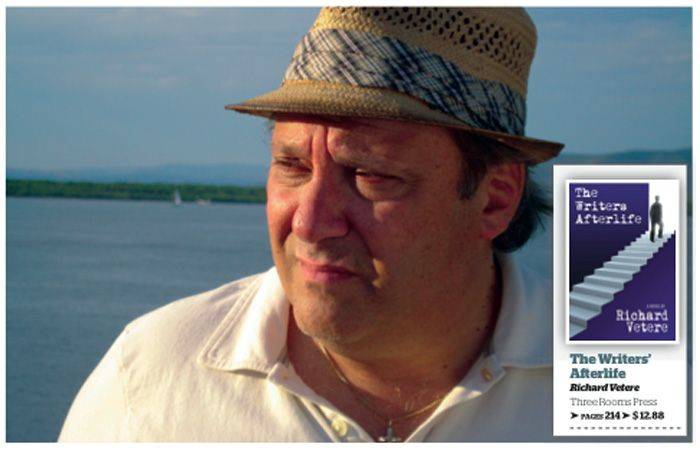BOOK. The Latest Effort of a Master Storyteller
You might know Richard Vetere through his poetry, his plays, his films, or his novels, but no matter the venue, he’s a true storyteller, able to take you into a world that’s familiar, but always doing it in unfamiliar ways. This is the mark of a master. His latest effort is a novel that brings life out of death to tell a story that’s one of his best.
The Writers’ Afterlife tells the story of Tom Chillo, novelist, screenwriter, playwright, and poet who dies before he can achieve the fame of which he has always dreamed. Chillo forsakes most of what us mortals dawdle in on our ways to the end of the road; he steadfastly dedicates his time and energies to his writing, avoiding all that might take his eye off the written page. Along the way he achieves success, but not in the way he needs in order to make it into the same afterlife as those greats he studied and emulated throughout his life.
The plot
Dying at the age of 44 from a stroke, Chillo is carried dreamlike into an afterlife reserved only for artists. Guided by Joe, a minor artist from history, Chillo is taken first on a tour of the writers’ afterlife where he rubs shoulders with the likes of “Eternals” such as Jane Austen, William Shakespeare, Emily Dickinson, Frank Kafka, Eugene O’Neil, Charles Bukowski and John Fante, and many more who reside in a place for those who actually achieved fame during their lives or long after their deaths because some living person persisted on the writer’s behalf. Those who don’t make it to the place reserved for the Eternals go either to the place for those who were famous on Earth but now forgotten or to The Valley of Those on the Verge, where Chillo nds himself. Joe explains that Tom will live without pain except for, “An acute sense of anxiety [for] Never being famous.” But there’s hope even here; Tom
has earned one chance to alter his state: “one opportunity to go back to life and do all you can to change the fate of your fame,” and this becomes the driving force of the novel’s plot.
What literature is made of
The dead writers are able to fashion their afterlives out of the same imagination that wrought the works that made them artists. They can choose to experience all this during their favorite time of their lives, even living with their characters if
they so choose. Vetere uses the early part of the novel to comment on the status of Chillo’s favorite writers and achieves a remarkable commentary on the state of literature in the mind of a writer, reminding us that literature is made out of other literature, and that every writer is, in many ways, in some type of competition with all the other writers who ever existed for an audience. He does all this in prose that’s lean, direct, and keeps the wheels of plot turning to a surprising finale. Chillo meets other promising writers in the Valley of Those on The Verge, and shares stories and sometimes bodies with those in whom he confides. He feels real love for the first time in this afterlife, and because of it, gets caught up in glitch that could ruin his one final chance to be called to his place with the Eternals.
A n all-Vetere tale
What happens when he comes back to Earth comes to us in a film-like tragicomedy that is part Dickens, part Poe, and part Mel Brooks, but a tale that ends up all Vetere. This is what the good writers do; they learn from their predecessors, and then as they work on their craft they move from imitation to innovation and develop their skills





































i-Italy
Facebook
Google+
This work may not be reproduced, in whole or in part, without prior written permission.
Questo lavoro non può essere riprodotto, in tutto o in parte, senza permesso scritto.